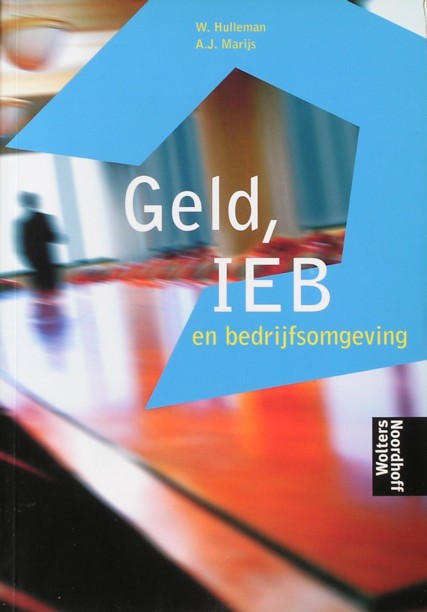

Since 2005 your columnist participated for several years in weekly discussions on the internet forum of the German economy-association Attac. There a handful of idealist scientists had taken on the challenge to share their economic insights with the people. They wrote daily contributions, and also reacted on the comments of visitors. Everybody was welcome. Such a personal attention is perfect for laymen, who want to increase their own knowledge1. Thus your reviewer became interested in mysterious terms, like M1 and M3, which apparently had something to do with money. The fascination led to the acquisition of Geld, IEB en bedrijfsomgeving, a year later. To prevent any misunderstanding, IEB is an abbreviation of "international economic relations".
The authors W. Hulleman and A.J. Marijs have established a good reputation as writers of introductory textbooks for higher education. The efforts of the duo are pedagogically sound2. And also this book does not disappoint. Just like in their other books they succeed in finding the right mix of theories, statistical facts, and examples from practice. The whole is enlivened by flow schemes, tables, simple graphs, and pictures (the latter fortunately not too much). The reading of this book was sufficient for henceforth discussing on an equal footing on the Attac forum, at least about money matters. Incidentally, it also helps in understanding more about our modern world, where the speculation has been developed into an art, and where RTL News is dominated by the stock notations.
What contents can be found in Geld, IEB en bedrijfsomgeving? The book begins with an explanation of money as a phenomenon, including the damned terms M1 and M3. Here Dutch banking is also described, at least the situation of 2005, because since then the Great Recession has led to changes. Next some remarks are made about the monetary policy, which in the present Europe is dictated by the European Central Bank. In this chapter the well-known Euribor interest rate is mentioned, among others. After thus sketching the financial world, the authors address the theme of international trade. Here they also discuss the famous theory of the comparative advantages, which can be used by the state against his trading partners. International trade is beneficial.
Next the authors return to money, and describe the trade in currency. Free exchange rates tend to lead to instability. Conversely, fixed exchange rates require, that the monetary policy of the concerned states converges. The interested reader has undoubtedly noticed this in the recent public debt crisis, which is evidently absent in this fourth edition. After thus also explaining the international aspect of finance, the capital market is addressed. The reader is informed about exiting and mysterious terms, such as the private market. This chapter is followed by the fascinating theme of the international cooperation. Since the Great Depression of the interbellum there is a vivid debate about such cooperation and integration. Both scientifically and politically there are attempts to find the optimal policy, and this historic search supplies useful matter for those, who have time to spare3.
The final three chapters are devoted to risk control, of respectively the interest rate, the currency notations, and the economic development of states. There is a need for rules of thumb. Although recently much effort has been spent on the development of risk theories, these chapters limit themselves to presenting a global survey. Prognoses of the conjuncture are required, but these are notoriously unreliable4. Incidentally, the conjuncture itself is not explained here; for this the other books of the two authors must be consulted.
Some reflection leads to the concluding résumé, that Geld, IEB en bedrijfsomgeving is not really easy to read. The theme simply forbids this. But Hulleman and Marijs do try, and at least create clarity. This is laudable, because many of their colleagues fail in this respect. Therefore the book can be recommended to anybody, who is interested in the global economy, and wants to engage in debates with some expertise.